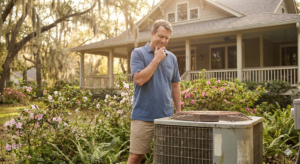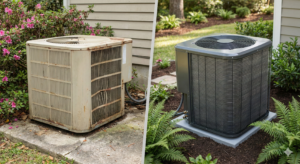When your home’s temperature doesn’t feel right, even with the HVAC system running, the problem might not be the unit itself. It could be the ductwork. While often hidden behind walls and ceilings, your air ducts play a big part in keeping your home comfortable. They move warm or cool air through your home and affect everything from airflow to air quality. When something goes wrong with the ductwork, small issues can turn into bigger headaches.
Homeowners in Charleston should be especially mindful. High humidity, older homes, and weather swings can all impact the performance of ductwork. Spotting problems early means you can take care of them before they get worse and bring back steady comfort throughout every room.
Uneven Heating And Cooling
If one room feels like a fridge while another feels like an oven, there’s a good chance your ductwork is acting up. Uneven temperatures around the house are one of the most common signs something’s off. You’ll probably notice this more during muggy Charleston summers or chilly winters.
Here are a few reasons why that might be happening:
– Leaks: When air escapes through cracks or holes in the ducts, certain rooms might not get enough warm or cool air.
– Blockages: Dust, debris, or leftovers from an old filter can clog parts of the system.
– Poor design or installation: If the ductwork isn’t sized or placed correctly, airflow will be off. This is common in older houses or homes that have had renovations or room additions.
A quick way to check this is to notice how long each room takes to get to the right temperature once your system kicks on. If your guest room stays clammy while the living room gets chilly fast, you might have a blocked or leaky duct in that section of the system. And when airflow is off, it puts more strain on your HVAC equipment, which can lead to earlier wear and tear.
Increased Energy Bills
No one likes a surprise when the utility bill arrives. If your energy costs are creeping up without any real change in usage or outdoor weather shifts, inefficient ductwork could be part of the problem.
When conditioned air leaks out before reaching its destination, your HVAC system has to run longer to make up for the loss. That means it’s using more energy than needed, which can quickly drive up your bills. Crushed ducts, loose fittings, or poor seals are all common causes that waste energy.
This issue may not be obvious right away. It often starts small, with your system gradually running more than before. Take note if your bills seem to be rising little by little, or if the HVAC seems to be working harder than it did last season. Addressing these duct issues can help you cut down on unnecessary energy use and extend your system’s life.
Poor Air Quality
If you’ve been dusting more than usual or dealing with new allergy symptoms, your ductwork could be part of the reason. Poor air quality inside your home often stems from what’s moving through your duct system.
Ductwork-related causes of reduced air quality include:
– Leaking ducts: These allow unfiltered air from attics, crawlspaces, or wall cavities to enter your living areas.
– Dirty ducts: Dust and debris can build up over time and blow right back into your home.
– Mold: Charleston’s damp weather can cause moisture buildup in ducts, leading to mold growth if not caught early.
Keep track of how clean your home stays between dustings, and if anyone at home has noticed more sneezing, itchy eyes, or breathing trouble inside, these might point to something wrong with your air ducts. Addressing these problems can help bring clean, healthy air back to every part of your home.
Strange Noises
Weird noises coming from walls or ceilings when your HVAC system is on can be more than just random sounds. Whistling, popping, or rattling are often signs your ducts are struggling.
Here’s what those sounds might mean:
– Whistling: Air squeezing through small gaps or holes.
– Rattling: Loose or shifting parts inside the ductwork.
– Popping: Temperature-related expansion of metal ducts, often due to poor insulation or setup.
Even though these sounds might not seem serious, it’s a good idea to get ahead of them. Left alone, they can turn into bigger problems, like broken duct sections or full-blown disconnections that impact comfort and energy use. Plus, nobody wants to listen to rattling all through the night.
Weak Airflow
When air barely pushes out of the vents, it could mean something deeper in your ductwork is off. Weak airflow makes it tough to keep your home at the temperature you want, especially in the Charleston heat.
Common causes of weak airflow include:
– Blockages: Clogs from dust, dirt, or even critters can get in the way.
– Disconnected ducts: Parts of the system can come apart, letting air escape before it reaches your rooms.
– Cracked or crushed ducts: Problems like this lower the air pressure moving through the system.
This isn’t just an inconvenience. Weak airflow often means your HVAC works double time for the same result, which drains more energy and wears out parts faster. Think of it like trying to water a big garden with a hose that’s folded in half. Not much gets through, and it takes a lot more effort to get the job done.
Staying Comfortable Year-Round
Knowing what to look for can help you catch ductwork problems sooner rather than later. Uneven temps, noisy systems, rising bills, and dusty air can all be warning signs. Left alone, these can snowball into major repairs and higher costs.
Calling in a professional makes a big difference. A trained technician can inspect your system, fix issues with precision, and make sure your air ducts are working at their best. When all the parts of your HVAC system, including the ductwork, are running smoothly, your home stays more comfortable, and your wallet gets a break too. Addressing your ductwork could be the solid step your Charleston home needs to stay cool, clean, and affordable all year long.
To keep your Charleston home operating at peak comfort and efficiency, it’s important to address any signs of ductwork trouble early. When it’s time to make improvements, professional air duct installation can help restore balanced airflow and reduce energy waste. Reach out to Coastal Carolina Comfort to schedule an inspection and get your HVAC system back on track.


